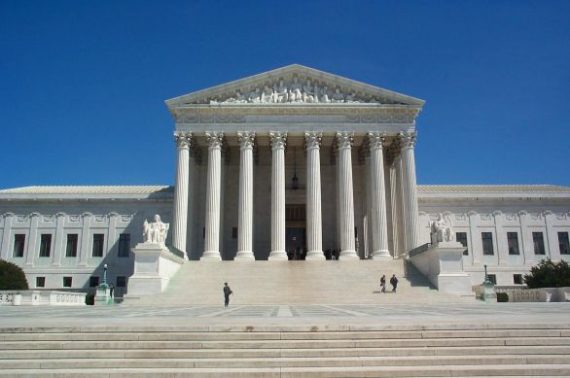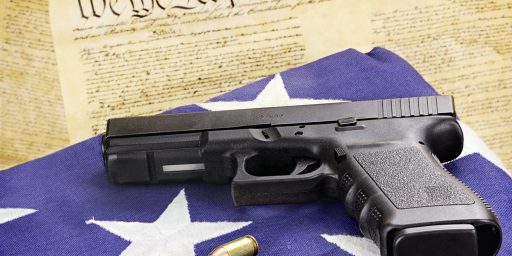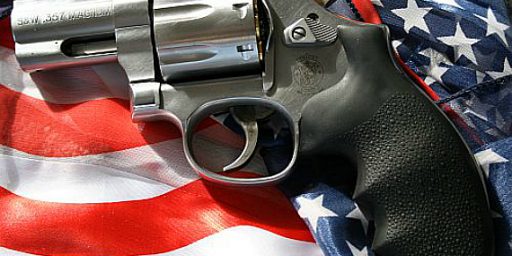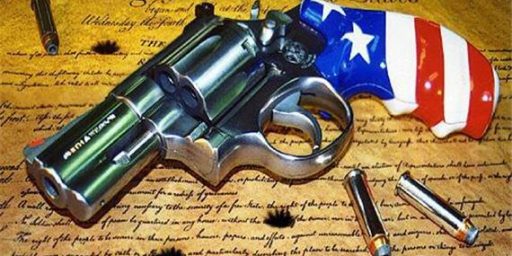Supreme Court Holds 2nd Amendment Applies To The States
The Supreme Court resolved a 100+ year old Constitutional ambiguity today, but the legal issues surrounding gun control remain as murky as ever.
In a 5-4 ruling, the Supreme Court cleared up a 124 year-old ambiguity and ruled that the 2nd Amendment does in fact apply to state and local laws regulating gun ownership and possession:
WASHINGTON (AP) — The Supreme Court held Monday that the Constitution’s Second Amendment restrains government’s ability to significantly limit “the right to keep and bear arms,” advancing a recent trend by the John Roberts-led bench to embrace gun rights.
By a narrow, 5-4 vote, the justices signaled, however, that less severe restrictions could survive legal challenges.
Writing for the court in a case involving restrictive laws in Chicago and one of its suburbs, Justice Samuel Alito said that the Second Amendment right “applies equally to the federal government and the states.”
The court was split along familiar ideological lines, with five conservative-moderate justices in favor of gun rights and four liberals opposed. Chief Justice Roberts voted with the majority.
(…)
Monday’s decision did not explicitly strike down the Chicago area laws, ordering a federal appeals court to reconsider its ruling. But it left little doubt that they would eventually fall.
Still, Alito noted that the declaration that the Second Amendment is fully binding on states and cities “limits (but by no means eliminates) their ability to devise solutions to social problems that suit local needs and values.”
This decision essentially overturns an 1886 decision in Presser v. Illinois where the Court held that the 2nd Amendment applied only to the Federal Government. However, since this case was decided before the Court began applying other provisions of the Bill of Rights against the states through the Due Process Clause of the 14th Amendment, it was unclear how a decision that held that the 2nd Amendment was alone in not being incorporated could possibly be good law. Today, the Court affirmed that it was not and that the individual right to keep and bear arms defined in District of Columbia v. Heller applies to the states.
Beyond that, though, there’s plenty of ambiguity.
The Court did not rule today that Chicago’s gun ban was unconstitutional. Instead, it remanded the case back to the 7th Circuit Court of Appeals for a determination on that issue. Presumably, though, the Court of Appeals will now be bound to apply the Heller standards to the Chicago law, meaning that it’s highly unlikely that the law can withstand Constitutional scrutiny.
The one thing Heller made clear, though, is that there is very little agreement on the Court about what constitutes a violation of the 2nd Amendment beyond the outright bans reflected in the D.C. and Chicago laws. It will be left to other cases and others courts to decide what Heller and McDonald mean for less restrictive gun control laws, or registration schemes that exist mostly to make it difficult to own firearms. As I noted more than two years ago while wrapping up the oral argument in Heller, this is just the beginning of a whole new round of Constitutional jurisprudence.
The entire opinion, all 214 pages of it, is embedded below:






Thomas’ most interesting concurrence in a long time. For a justice who lives and breathes brevity, the scope of his analysis speaks volumes.
He also happens to be wholly correct, but it seems no one else is listening.
Good step forward. Sounds like it still leaves a lot of discretion to individual states/cities on on issues like concealed carry.
Steve
“Thomas’ most interesting concurrence in a long time”
Interesting because he relies on the privileges and immunities clause and not the, now standard, substantive due process rationale.
I was totally unaware constitutional rights enumerated by the first ten amendments, which were guaranteed to each and every citizen were subject to State approval. The document is written in plain english so that citizens know what government is and is not supposed to be doing. There are no hidden clauses or hidden meanings. When an amendment states “Congress shall make no laws”, they are referring to the federal congress. The one that occupies Washington DC. When the document states a right “shall not be infringed”. Well if you are confused about what infringed means, get a Websters out and look it up. Does not exept states or local governments from observing and respecting that right. What I find disturbing is 4 justices had opinions against what is clearly written in the constitution. If you want to bring up the militia part of the right, notice the comma between the statement and the right itself.
ZR — Well, now there is a hidden clause in the second amendment. It’s the one that five radical reactionary activist supreme court justices pretended doesn’t exist. You might look for an older edition of the constituion to check it out. It includes the words “a well regulated militia.”
The militia clause has no bearing on the right whatsoever.
“Automobiles being unreliable in the long-term, the right to keep and use tools shall not be infringed.”
“Food being necessary to sustain life, the right to keep and use tractors shall not be infringed.”
Get it? It merely gives one (of many possible) applications of the right, one which was considered important in upholding the right. It doesn’t define the only application. Tools and tractors are useful for any number of things. The tools and tractors are what are protected, not the automobiles or the food.
Imagine, nine justices sitting in black robes deciding which constitutionakl rights to the several statess, and which ones do not.
TFR — That’s a nice interpretation. It’s also one that every supreme court said was wrong, until the current activist majority decided to overthrow two centuries of jurisprudence.
You can say they were right or you can say they were wrong, but you can’t say that they are conservative, or that they respect the constitution as it has been interpreted throughout history.
wr – have you even read Heller? In his dissent, Breyer outlines that “the entire Court subscribes” to the idea that “[t]he Amendment protects an ‘individual’ right.” Stephens agrees, saying “surely [the second amendment] protects a right that can be enforced by individuals.” The dissenters’ disagreement is about the level of regulation that can be lawfully applied without violating this right.
There is no need to explain the meaning. The Bill of Rights was clearly and precisely written
I don’t give a squat what two centuries of supreme court have interpreted. There’s no such thing as a “collective right”. Individuals have rights. “Collectives” are made up of individuals.
Perhaps they aren’t conservative, or don’t respect previous interpretations, but perhaps they are attempting to return to orginal meaning, and kill two centuries of meddling activism.
This is exactly the kind of crap that some of the founders feared – that an enumeration of rights would result in nit-picking each one to death. They considered these rights as natural, obvious things that representative government would protect as a matter of course. Well, they were right about the nit-picking, and wrong about the protecting. The supreme court has gotten so many things wrong of late, I’m glad they got this one right.